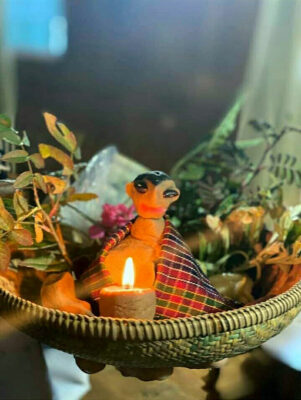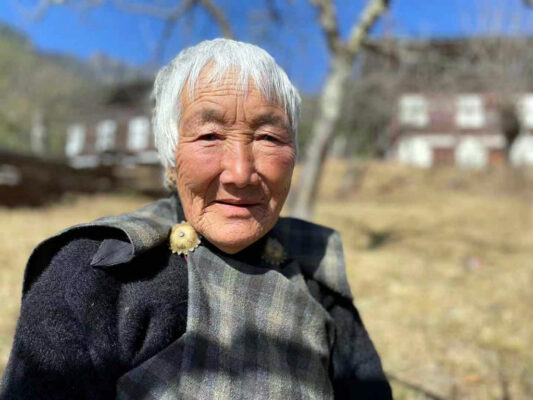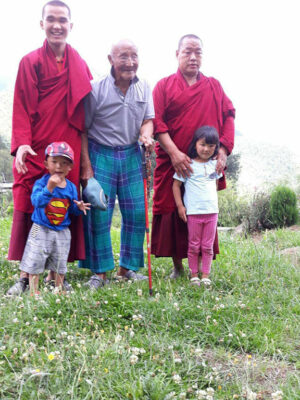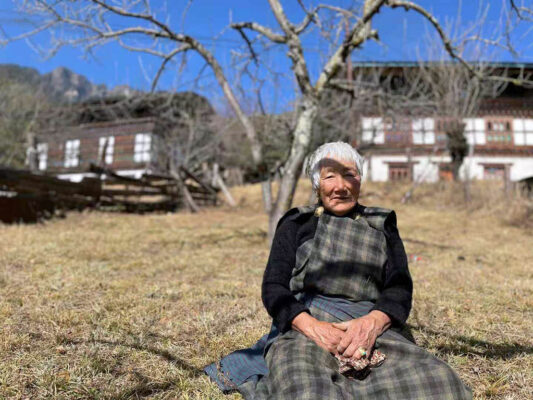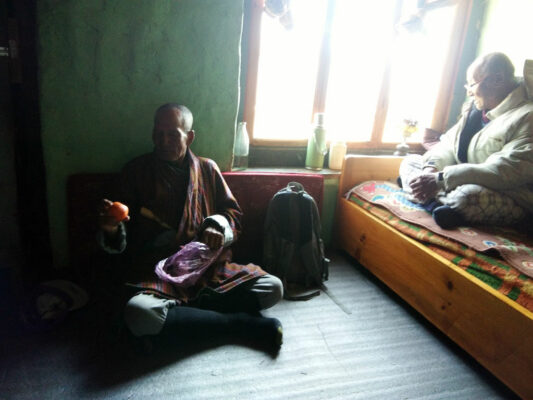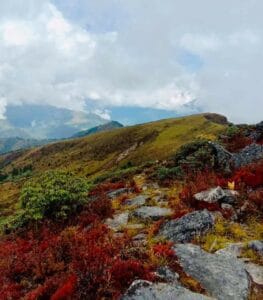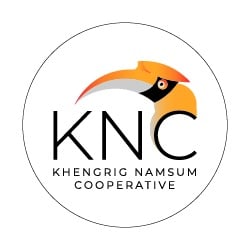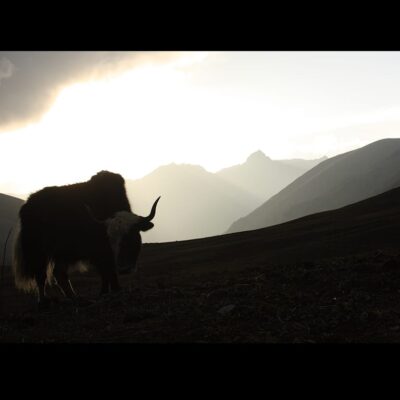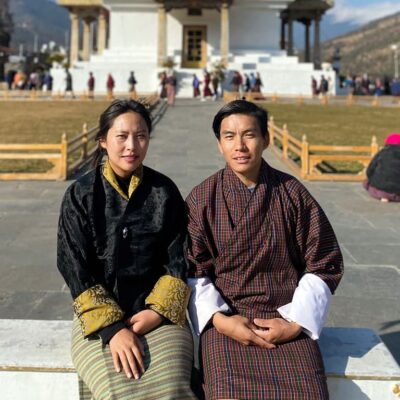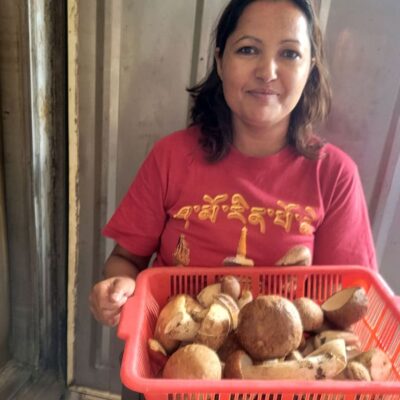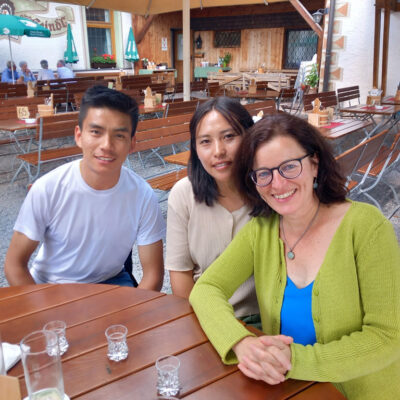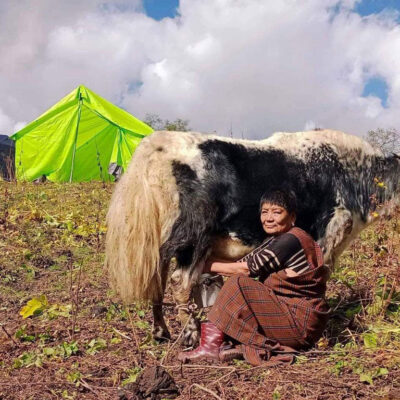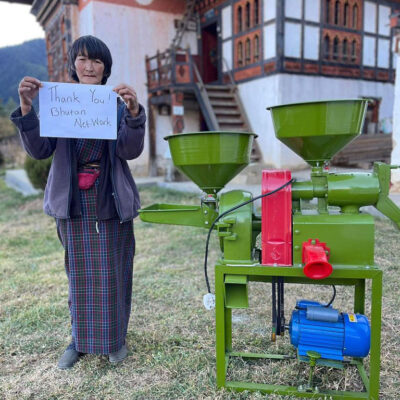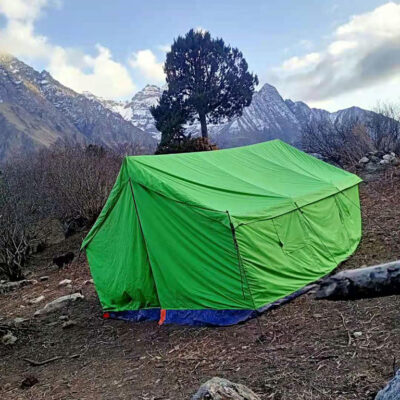This post is also available in: Deutsch (German)
By Dorji Bidha (Drukgyel Farmers)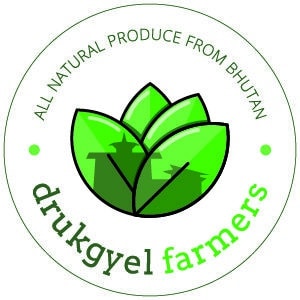
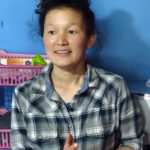
Every year Lomba, the New Year celebration in Paro and Haa, is observed from the 29th day of the 10th month until the 1st day of 11th month, following the lunar calendar. During Lomba it is considered auspicious that members of a household get together and enjoy the festivities. Therefore this Lomba I am with my grandparents, listening to their stories about the past, almost a century ago. They are a wealth of knowledge and wisdom.
Lomba: Delicious food and “throwing out” evil
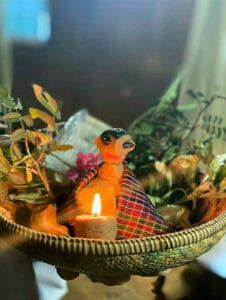 The people of Paro enjoy jomja, local sweet cakes made from brown rice, or preferably white rice called tan tseri from Punakha. Similarly, the Haap, people of Haa, enjoy a local dish called hoentey, stuffed local dumplings made from buckwheat. Both hoentey and jomja are associated with good fortune, happiness and health; therefore, we don’t prepare these food items if there is death or illness in the home.
The people of Paro enjoy jomja, local sweet cakes made from brown rice, or preferably white rice called tan tseri from Punakha. Similarly, the Haap, people of Haa, enjoy a local dish called hoentey, stuffed local dumplings made from buckwheat. Both hoentey and jomja are associated with good fortune, happiness and health; therefore, we don’t prepare these food items if there is death or illness in the home.
At dusk on the 29th day of the 10th month we also have to perform the lue-ritual to ward off misfortune, negativity and sorrow. First we have to make a lue (dough figurine) made of wheat flour, resembling human form. While the size of the lue may differ we have to include all the essential ingredients, dru nga ghu (the nine traditional grains: buckwheat, barley, wheat, rice, millet, maize, mustard, amaranth and legumes). We then take the little figurine outside the house and chant prayers for the year; we pray for our continued and long health, a good harvest and renewed relationships, thuenlam. We then throw away (“throw out”) the lue believing that by doing so we have eliminated misfortune, negativity and sorrow from our life, all of which has been transferred to the figurine. In 2020 we also requested that corona virus would be thrown out with the lue!
 The links between Haa and Paro valleys
The links between Haa and Paro valleys
Those who do the Sagala trek will understand why the people of Paro and Haa have so much in common, including our new year Lomba. The Sagala mountain ridge divides our two districts but we can easily cross the pass within a few hours and reach either ends of the two valleys. Our local deities lie on either side of the ridge.
Sagala trek is also known as the “Haa rice planters’ route” since the farmers of Haa and Paro traditionally used to work the rice fields together (sharecropping). This culture existed long before Dasho Nishioka, a Japanese agricultural expert, had succeeded in enhancing the rice yield by three times through improved seeds. Nishioka was sent to Bhutan by the Japanese government in 1964 to help modernize our farming sector. He lived and worked here for over 28 years. Nowadays we have a road infrastructure with buses and cars, so the practice of (and culture around) sharecropping by crossing the Sagala ridge has dwindled to a minimum.
Listening to stories from the past
This Lomba, I am sitting next to my grandparents as they narrate their life stories. Grandmother Jum Tso lham is now seventy-eight years old and grandfather Jojo Jow, ninety-one. Like most of the middle-aged and older Bhutanese generations, both my grandparents have lived under four kings, from His Majesty the second King, Jigme Wangchuck, to our fifth King, Jigme Khesar Namgyal Wangchuck. Both my grandparents are therefore contemporary witnesses of the transformations in our kingdom in recent decades.
The hardships of a past life
Grandmother Jum Tso Lham recalls being subjected to woola, a severe labor tax 60 years ago, when she was still a teenage girl. Back then she was so poor that she didn’t even have proper clothes to keep herself warm, let alone a second set to change into. She describes wearing a plain simple kira for her duties of woola, for which she had to walk for days and nights in a row. She recounted that during those days it was so freezing cold that she started chewing a lot of areca nuts wrapped in betel leaves (doma). The effect of doma, a rush of heat, was the only option to keep her warm. It was not until around 1958, during the third king’s reign, that the heavy burden of the woola taxation was alleviated.
Grandfather Jojo Jow meanwhile reminded us that we should always feel lucky to have been born in Bhutan under our visionary and compassionate kings. According to him it is thanks to them that we don’t have to cross the toughest passes in the Himalayas, into Tibet, to get salt anymore.
However, I am not content; I believe that we, the people, are still not doing enough for our nation building, considering the recommendations and guidance of His Majesty the King. To give an example, our farm was doing better 30 years ago during Dasho Nishioka’s time. More recently, during the second lockdown, we could not even continue growing our own vegetables and fruits for self-sustenance; whilst we know how to grow vegetables, in the winter we can’t grow anything here without greenhouses. If the government subsidized greenhouses for us we could be more self-sufficient. For instance, at Barshong (at an altitude of 3000m plus), they all grow green vegetables since each household received a greenhouse from the government.
Salt-trade with Tibet: a dangerous journey
While I was lost in my thoughts about contributing more to our nation building, my grandfather Jojo described how, when he was young, he accompanied his father to Phari in Tibet to get salt. Unfortunately on the way they came across andos (robbers) and he was hit on the forehead with a sharp knife yet survived the incident despite the harsh weather. Yes, during those days they encountered armed thieves who stole their belongings, including gold rings, ear-rings and original cat eyes (precious stones). The robbers posed a constant danger while going to and from Tibet for trading salt and essential items.
Heavy taxes and traditional “tax evasion” in olden days
Straight after returning from Tibet, Jojo had to go into the deep forest and make shinglay (wooden shingles) for his home.
Only a few days later he also had to leave for his woola contribution, transporting goods to the Dzong, the monastic fortress and center of administration. Back then the districts were ruled by regional governors with considerable power. The third King’s complete abolition of these heavy labour and in-kind taxes therefore lifted a great burden from the shoulders of peasants like my grandparents.
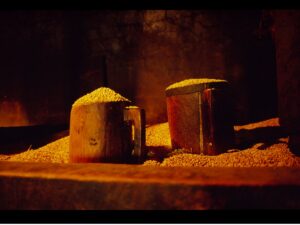 Grandmother Jum Tsho Lham, also shared how boed (representatives of regional governors) would visit each and every paddy field right after the harvest, selecting and taking with them a substantial amount of the crops. She used to get emotional because the family’s yields, the fruits of the year’s hard work, were taken and she worried what her family will eat during cold winter nights. To ensure survival of them and their families, Bhutanese farmers therefore practiced evasion tactics to avoid the heavy taxation. For example, as the grains were measured in a container (drey), before the boed arrived they would mix chaff with actual grains since the rice was collected unhusked. In fact part of Jum Jayso Lham’s name – Jayso – means “a child who was put inside a drey” right after the birth to purify the baby from sickness and evil spirit attacks.
Grandmother Jum Tsho Lham, also shared how boed (representatives of regional governors) would visit each and every paddy field right after the harvest, selecting and taking with them a substantial amount of the crops. She used to get emotional because the family’s yields, the fruits of the year’s hard work, were taken and she worried what her family will eat during cold winter nights. To ensure survival of them and their families, Bhutanese farmers therefore practiced evasion tactics to avoid the heavy taxation. For example, as the grains were measured in a container (drey), before the boed arrived they would mix chaff with actual grains since the rice was collected unhusked. In fact part of Jum Jayso Lham’s name – Jayso – means “a child who was put inside a drey” right after the birth to purify the baby from sickness and evil spirit attacks.
Another method her mum, my great-grandmother, Jum Jayso Lham, used was to hide small portions of the grains underneath the floor covers, which were made out of the skin of domestic animals.
While my grandmother Jum Tso Lham and her mother Jum Jayso were kept busy at the village, Jum Tso Lham’s father, Jojo Bokhu, meanwhile had to carry goods in service of the boed at Lingzhi. Therefore, even today it is with great joy in her eyes, that Jumo recounts how important it was to peasants that the woola tax was abolished by the third King, and they could instead keep their entire, hard-earned crop yields.
Moving forward, working together
These stories touch me because my grandparents went through a lot of struggle to reach where we are today. Therefore, it’s high time, I believe, that we all ‘buckle up’, to work better and more efficiently. During the 113th National day, His Majesty the King addressed the nation and the main highlights of his speech will hopefully have made an impact on the minds of public servants as well as the rest of the people. Only through profound change of mentality within the public service and administration, can we bring change and positive development to our country.
So far, for a simple farmer like me, working the field but also having to get so much paperwork done, such as renewing environmental and location clearances, is burdensome. For me it’s more important (and fun!) to dig an entire field and raise a fine crop than have to deal with more administration (paperwork and reporting to civil servants) than is perhaps necessary.


